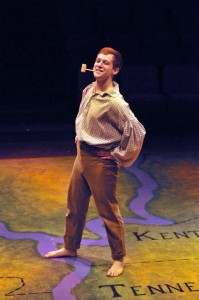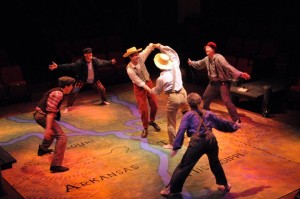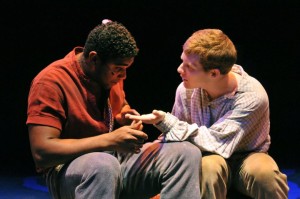
Glendale Centre Theatre’s in-the-round stage provides the perfect setting for the 1985 Tony-winning Best Musical Big River: The Adventures of Huckleberry Finn, placing the audience smack dab in the middle of the Mississippi with Huck and Tom’s self-propelled raft just yards away from even the farthest onlooker.
Big River: The Adventures of Huckleberry Finn is, of course, the musical adaptation of Mark Twain’s classic 1884 novel of the same name (minus the “Big River”). Though Tom Sawyer appears as a major featured character, the storyline this time belongs to Huck, or better put, to Huck and escaped slave Jim, who travel the Mississippi in hopes of a new life for Huck and freedom for his companion in adventure. With book by William Hauptman and music and lyrics by the late, great country music superstar Roger “King Of The Road” Miller, Big River has brought bluegrass and country to Broadway, the rest of the U.S., the world, and now to Glendale.
It’s not just the set and seats that are in-the-round. From the show’s thrilling opening number, “Do You Want To Go To Heaven?” Alexander & Michaels’ direction and Alexander’s energetic choreography play to all four corners of the house, Huck’s adoptive family, his fishing buddies, assorted townspeople, and even local slaves standing in the aisles passing judgment on the ever rambunctious Huck, voted least likely to pass through those pearly gates.
Huck’s adoptive mother (aka the Widow Douglas) and her spinster sister Miss Watson are none too happy with their charge’s recurring shenanigans, the latest of which is to form a band of thieves with best friend Tom and the rest of “The Boys.” Frustrated with the constraints of his new life, Huck attempts a return to the home of his alcoholic Pap, drunker than ever and railing as always against the “Guv’ment.” Escape seems the only out for Huck, who fakes his own death by scattering pig’s blood around Pap’s shack. Hiding out on Jackson’s Island, Huck meets Jim, also on the run, though in Jim’s case the reasons are far more serious. He has made his escape to avoid being sold down the river. Together, Huck and Jim make plans to travel the Mississippi as far as Ohio, which they hope will be the first stop on their path to freedom. The mismatched pair’s adventures have just begun.
It’s hard to imagine a more perfect choice to play Huckleberry Finn than 20-year-old musical theater vet (but L.A.-area newcomer) James McGrath, spunky, adorable, charismatic, and utterly winning as Huck. “Waitin’ For The Light To Shine” is but one of the songs young McGrath sings in his clear, powerful tenor. The role of Huck requires an actor to be onstage virtually from start to finish, and the sensational McGrath executes it without a single misstep.
As Jim, the superb James Fowler recreates the role which won him a Scenie for Outstanding Performance By A Lead Actor in Actors Co-op’s 2009 revival. As he did a year and a half ago, Fowler brings a profound dignity to Jim that belies his young years, and sings in a baritone as gorgeous as any heard in the role, particularly in the rafters-raising spiritual “Free At Last.” As an added bonus, Fowler and McGrath share palpable onstage chemistry, making their pairing a match made in musical theater heaven.
Big River is filled with dozens of great supporting and cameo roles, many of whom get their own solo or showcase number. Stephanie Hayslip and Dynell Leigh are a self-righteous hoot as Miss Watson and the Widow Douglas, joining disapproving voices in “Do You Wanna Go To Heaven?” Bob Moran brings Twain’s iconic Tom Sawyer to boyish, boisterous life, and sings “The Boys” and “Hand For The Hog” with enthusiasm and vim. Lyndie Renee is a charming Mary Jane Wilkes, lending her rich soprano to “You Oughta Be Here With Me” (with Jillian Gomez and Christa Hamilton) and “Leavin’s Not The Only Way To Go” (with McGrath and Fowler).
Richard Malmos is the production’s standout scene-stealer in not one but two roles, first as Huck’s drunk and delirious mess of a Pap, ranting against the dad-gum “Guv’ment,” and later opposite a fabulous Shawn Cahill as King and Duke, the supposedly long lost heirs to the French Throne and the Duchy of Bridgewater, probably the oddest mismatched pair of rapscallions ever to grace a Broadway (or Glendale) stage. The comic duo not only join voices with McGrath for the Act One closing number, “When The Sun Goes Down In The South,” but their rendition of “The Nonesuch” (“She’s got one big breast in the middle of her chest and an eye in the middle of her nose. So says I, if you look her in the eye, you’re better off looking up her nose.”) is riotously entertaining.
Narrating Big River is none other than Mark Twain himself, played by a folksy Kyle Kelley, who also plays the Doctor and Sherriff Bell. Leigh also appears as Sally Phelps and Hayslip as a very Strange Woman. James Womack does solid work as Judge Thatcher, Harvey Wilkes, and Silas Phelps. Paul Reid plays Ben, Lafe, and most notably, a hilarious Young Fool singing the infectious “Arkansas.” As Alice’s daughter, Raquel Cockrell proves herself American Idol-ready, blasting the rafters with a superbly soulful “How Blest We Are.” Cockrell, Marianne Lewis (Alice) and Espiridon Magana do fine, touching work as a trio of slaves, joining voices on the powerful “The Crossing.” Also doing commendable work in multiple roles each are Gomez, Hamilton, dance captain Kevin Holmquist, and Frankie Marrone.
As for the directing team, Michaels is the triple threat Scenie-winning star of GCT’s The Will Rogers Follies and Forever Plaid, and Alexander the director of both of those excellent productions. Working together here, they have guided their entirely non-Equity cast to performances that can easily compete with their CLO and National Tour counterparts’.
Musical director Steven Applegate gets his singers vocalizing and harmonizing to perfection, backed by prerecorded tracks that, while lacking the excitement of a live band, have the advantage of being recorded by a full musical ensemble. As always Angela Wood and Glendale Costumes provide a bevy of absolutely splendid garb for the large cast to wear in nearly four dozen roles. The uncredited set, lighting, and sound designs are also first rate, especially that marvel of a raft.
I wish that Glendale Centre Theatre hadn’t seen fit to censor Mark Twain and Hauptman’s original book. Less than two years ago, Actors Co-op (L.A.’s premier Christian theater company) let Huck Finn shock our 21st Century ears with his frequent use of the “N” word, spoken casually and without ill intent and all the more startling and disturbing for that. Roger Miller himself stated in a 1985 interview, “That word ‘nigger’ is used in the play a lot. I hate to even say it, it’s so far from my spirit, but we have to use it because it’s in the novel.” Huck starts his Big River ride not terribly comfortable with Abolitionism and ends his journey with eyes newly opened to the dignity of his fellow man. At GCT, we understand this change of mind and heart, but had the production “stuck to the script,” Huck’s emotional and educational journey would have resonated with even greater power.
Still, the reasons to see Big River at Glendale Centre Theatre far outweigh any unfortunate script sanitization. This is a wonderful rendition of Big River, led by a couldn’t-be-better McGrath and Fowler, with an all-around terrific supporting ensemble. Since attending GCT productions, I’ve become a big fan of their in-the-round renditions of Broadway musicals, comedies, and dramas alike. Big River is no exception.
Glendale Centre Theatre, 324 N. Orange St., Glendale.
–Steven Stanley
April 2, 2011





 Since 2007, Steven Stanley's StageSceneLA.com has spotlighted the best in Southern California theater via reviews, interviews, and its annual StageSceneLA Scenies.
Since 2007, Steven Stanley's StageSceneLA.com has spotlighted the best in Southern California theater via reviews, interviews, and its annual StageSceneLA Scenies.







 COPYRIGHT 2025 STEVEN STANLEY :: DESIGN BY
COPYRIGHT 2025 STEVEN STANLEY :: DESIGN BY